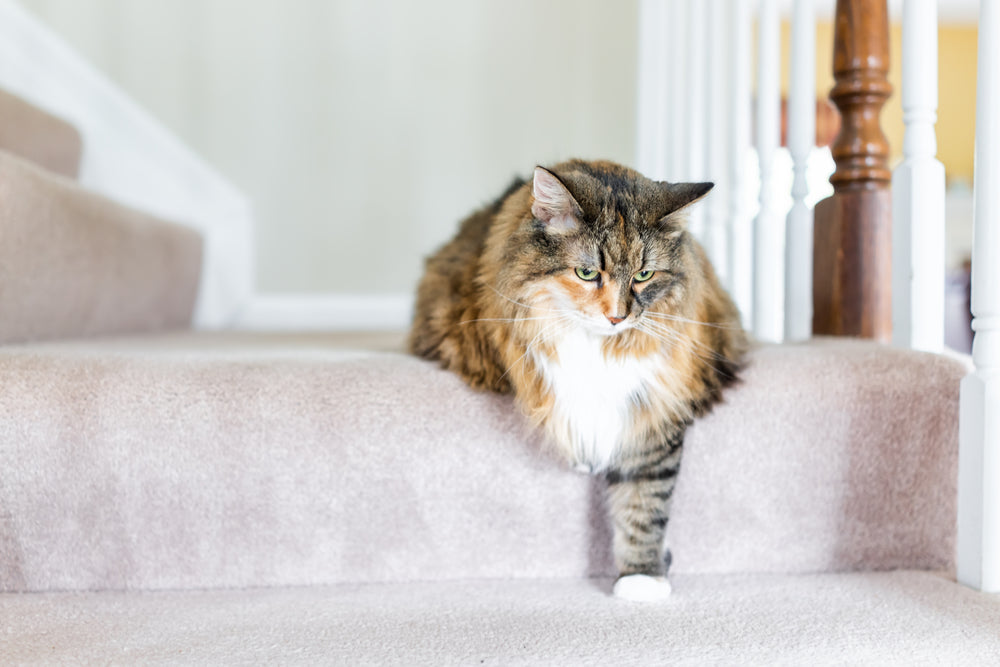We all want to make every effort to save our pets from unnecessary
pain and suffering. Many cats and dogs suffer from pet joint problems at various points in their lives. The good news is that many of these issues can be prevented with simple lifestyle changes. There are also steps you can take to make your home more comfortable for your pet if they
do have joint problems; these comfort measures can also help prevent the issues from getting worse. Read on to learn more about how to prevent pet joint problems in your cat or dog.
Stick to a Healthy Diet for Your Pet
One lifestyle factor that can cause or exacerbate pet joint pain is obesity.
Obesity is a common malady in pets; it is estimated that half of all dogs are overweight or obese. There are two reasons that obesity can cause or exacerbate joint pain.
- The joints have to work harder when an animal is overweight or obese; this causes wear and tear over time.
- The excess fat itself causes inflammation throughout the body, and this can present as joint pain.
The best way to avoid obesity in your pet is to stick to a healthy diet and correct portion sizes. Commercial dog or cat food is designed to contain all of the nutrients that your pet needs at various points of their life. Choose the formulation that is correct for your pet’s age and activity level. Your veterinarian will be able to advise you as to which brand is best and how much you should feed your pet each day. Some people prefer to feed their pets homemade food. Be advised that this is only a good idea if you are willing to do the research on which nutrients and how many calories your pet needs on a daily basis. Also,
do not feed your pet table scraps; these can cause not only obesity but also stomach upset. Talk to your veterinarian about what is the best diet for your cat or dog.
Make Sure Your Pet Gets the Right Type of Exercise
Getting regular exercise is important for everyone, and your pet is no exception! Whether you take your dog for a long walk each day, play ball in the backyard after dinner, or encourage your cat to get off of the furniture and spend some time running around and playing, it is wise to get your pet moving daily. One caveat: The wrong type of exercise can actually make joint pain worse. Running with a dog on hard pavement for long stretches can irritate joints. Doing this with a puppy, particularly a puppy who will grow into a large dog, can increase their odds of developing hip dysplasia, which can cause disability and a lot of pain later in life. Exercise your pet on grass, sand, and other surfaces that are softer than concrete or pavement.
Make Accommodations in Your Home

If your pet is suffering from joint pain, you can make some accommodations in your home to make it easier for them to get around without causing additional pain. If your pet struggles on the steps, consider moving their bed, kitty litter box, and other pet paraphernalia downstairs so they don’t have to go up and down. Use the entrance and exit to your home that has the fewest stairs; rather than going down a flight of stairs off of a deck, for example, take them out the front door if you have just two or three stairs down from the front porch. You might also think about using area rugs or even installing carpeting in the room or rooms where your pet spends the most time. Tile and hardwood can be uncomfortable for your pet to lay on, so giving them a soft surface to rest on can help. Finally, purchase a supportive pet bed for them to lay on. If your pet usually sleeps on the couch, human beds, or other soft furniture, they might find it comfortable but have trouble getting on and off. A pet bed placed on the floor will give them a soft place to sleep without having to climb up and down. The bed should not be extremely soft; it should offer some support along with a layer of softness.
Give Your Pet an Appropriate Supplement
Using supplements can help reduce inflammation and keep your pet’s joints feeling as good as they can to reduce or eliminate pain. There are several different types of supplements that might help.
1TDC™, for example, is a supplement that contains nutrients that are good for pet joint health. In addition, it contains ingredients that improve their coat, their stamina, and their oral health. This is routinely given to sporting dogs who need the extra stamina and endurance and who tend to put a lot of pressure on their joints, but it can be used for any dog or cat who might be prone to joint problems. Talk to your veterinarian about which supplements are best for your cat or dog to prevent pet joint problems.
 If your pet is suffering from joint pain, you can make some accommodations in your home to make it easier for them to get around without causing additional pain. If your pet struggles on the steps, consider moving their bed, kitty litter box, and other pet paraphernalia downstairs so they don’t have to go up and down. Use the entrance and exit to your home that has the fewest stairs; rather than going down a flight of stairs off of a deck, for example, take them out the front door if you have just two or three stairs down from the front porch. You might also think about using area rugs or even installing carpeting in the room or rooms where your pet spends the most time. Tile and hardwood can be uncomfortable for your pet to lay on, so giving them a soft surface to rest on can help. Finally, purchase a supportive pet bed for them to lay on. If your pet usually sleeps on the couch, human beds, or other soft furniture, they might find it comfortable but have trouble getting on and off. A pet bed placed on the floor will give them a soft place to sleep without having to climb up and down. The bed should not be extremely soft; it should offer some support along with a layer of softness.
If your pet is suffering from joint pain, you can make some accommodations in your home to make it easier for them to get around without causing additional pain. If your pet struggles on the steps, consider moving their bed, kitty litter box, and other pet paraphernalia downstairs so they don’t have to go up and down. Use the entrance and exit to your home that has the fewest stairs; rather than going down a flight of stairs off of a deck, for example, take them out the front door if you have just two or three stairs down from the front porch. You might also think about using area rugs or even installing carpeting in the room or rooms where your pet spends the most time. Tile and hardwood can be uncomfortable for your pet to lay on, so giving them a soft surface to rest on can help. Finally, purchase a supportive pet bed for them to lay on. If your pet usually sleeps on the couch, human beds, or other soft furniture, they might find it comfortable but have trouble getting on and off. A pet bed placed on the floor will give them a soft place to sleep without having to climb up and down. The bed should not be extremely soft; it should offer some support along with a layer of softness.





